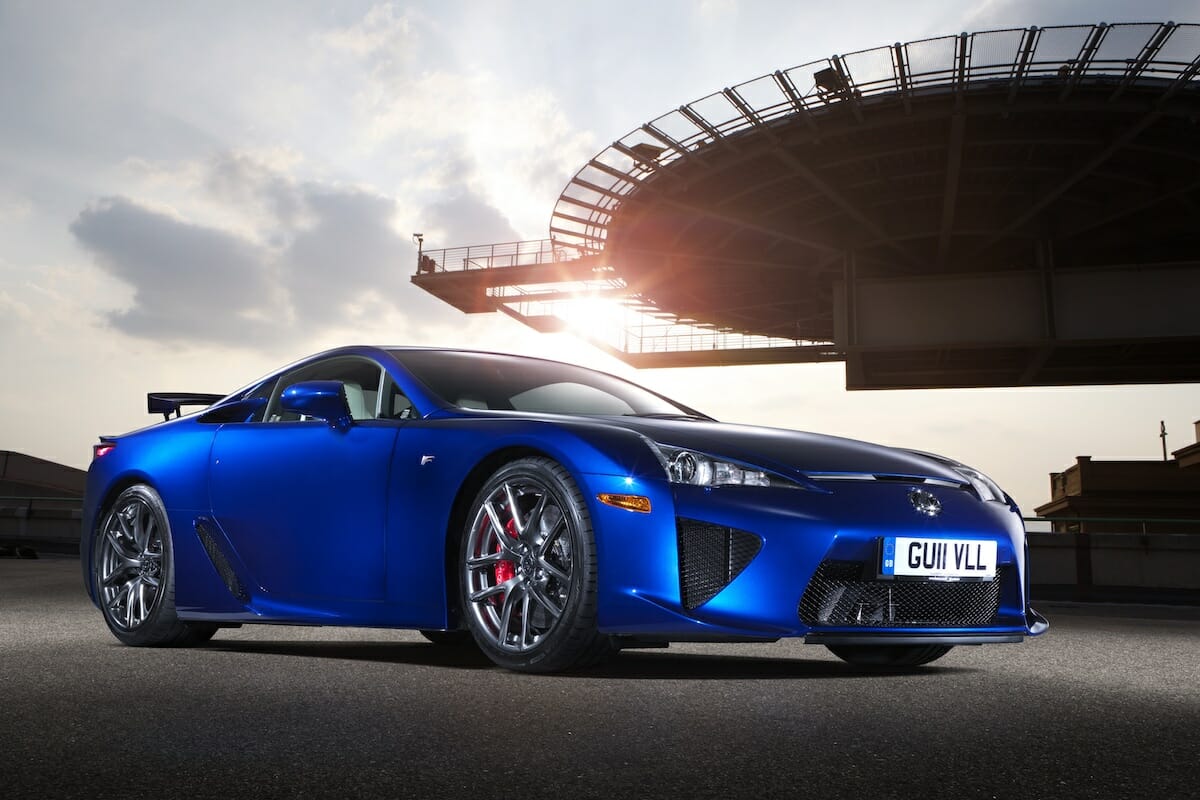Lexus Lfa How Many Made
The Lexus LFA's bespoke V10 was a showcase of engineering expertise and one of the best-sounding engines ever. Check out what made it so special.

These days, when it comes to the majority of modern cars, they are driven by numbers — with fuel economy, production costs, and profit margins all defining factors in modern automotive mass production. Occasionally, though, a car comes along that's motivated entirely by a car company CEO's vision of building the best car it possibly can. And the Lexus LFA was one defining example of this.
After taking the helm as CEO of Toyota in 2009, Akio Toyoda, who is the great-grandson of the company's founder, pledged to put an end to the company building cars perceived as boring, as Autoweeknotes.
And key to setting the tone for the direction he wanted to push Toyota and its luxury sub-division, Lexus, in was an intricately-engineered supercar that would be a halo model for the company.
Development of the LFA kicked-off in the early 2000s, and the LFA concept debuted in 2005. But the actual model would not surace until 2009, when it debuted at the Tokyo Motor Show.
Despite a list price of around $400,000 when new, Evo reports that the company actually lost money on every one of the 500 LFAs it sold.
Although viewed as overpriced and underpowered against its competition, time has been kind to the LFA. Its well-aged design, impeccable build quality, and its utterly thrilling engine in particular have made it a highly-collectable modern classic. And it has only appreciated in value. So, just what makes its definitive engine so special?
What Kind of Engine Does a Lexus LFA Have?

Officially called the Toyota 1LR-GUE, the engine that powered the Lexus LFA is bespoke to it. A gas-powered V10, it's 4.8-liter (293.2 cu in) displacement ensured that it would be smaller than a V8 engine in terms of overall size. It was built from a combination of magnesium alloy (for the cylinder head) and titanium alloy (which is 40% lighter than conventional iron) to keep it lighter than most V6 engines.
The 1LR has a bore and stroke of 3.46 in by 3.11 in (88 mm by 79 mm) and there is a 72-degree angle between the two cylinder banks. AsMotor Trendnotes, the LFA engine's cylinder heads were designed by Yamaha. The cylinder heads feature dual overhead camshafts with four valves per cylinder, and lightweight titanium valves are used.
A dry-sump lubrication system is also used to improve the engine's tolerance to sustained high-speed cornering. And each of its 10 cylinders are fed air through individual throttle bodies – both features most commonly seen on racing cars.
Able to rev from idle to its 9,000 rpm redline in a shockingly-fast 0.6 seconds, the LFA's engine produces 552 hp (412 kW) at a screaming 8,700 rpm. That is an incredibly high specific output of 115 hp (86 kW) per liter. This was higher than Ferrari and Lamborghini V12s of the day. But it was proportionally low on torque with only 354 lb.-ft. (480 Nm), which is developed at 6,800 rpm.
Over 90 percent of it was developed from 3,700 rpm, as Joe Clifford explains in Lexus U.K. Magazine, thanks to clever ECU tuning concerning the variable valve timing. In the LFA, this power is enough to help it sprint from 0-62 mph in 3.7 seconds and on to a top speed of 202 mph.
Is the Lexus LFA Turbocharged?

With a fast and free-revving engine the ultimate goal here, turbocharging was never going to be an option for the Lexus LFA's V10, and so it is not turbocharged but instead naturally aspirated.
Despite the fact turbocharging would have provided it with far more torque in particular, along with more power, the inherent lag of a turbocharged engine means that the incredibly quick speed the LFA revs from idle to redline would not be possible with a turbocharger fitted.
Being naturally aspirated, the LFA's V10 was given individual throttle bodies along with intake runners that were as short as possible. This was to help it breathe more easily without the need for forced induction. And this free-flowing air intake setup also contributed to its distinctive engine noise as well, as Wheels points out. Its 12:1 compression ratio is higher than most turbocharged gas engines also.
How Much is an LFA Engine?
Thinking of swapping a Lexus LFA engine into your project car? Wondering how much it would cost to replace the engine in an LFA? Well, that's a question equivalent to "how long is a piece of string?"
Given the LFA's original price of around $400,000 in the U.S., and the fact that only 500 were ever made and nearly a decade ago at that, tracking down one of these incredible V10 engines is an almost impossible task. Even from a wrecked example, given their rarity, it is not easy obtaining a price for this hand-built engineering masterpiece.
Servicing it likely isn't cheap, either. Top Gear reports that Toyota's Motorsport HQ in Germany, which handles the servicing of European LFAs, "[treats servicing] an LFA like a Le Mans car," with body panels being removed and every nut and bolt poured over.
The value of buying a whole, functioning LFA these days is an easy number to establish, though. The Drive reports that in 2018, a Nürburgring Package model sold for $700,000 at auction.
One of the most recent examples to be sold was a one-off Pearl Brown Metallic model which Drive Tribe reports was offered for $680,000.
Lexus's LFA Engine: An Engineering Masterpiece

One of the fastest-revving and best-sounding engines of all time and with a specific output that blitzed its competition, the V10 engine that powers the Lexus LFA is clearly a true masterpiece of modern automotive engineering.
Its sheer rarity and intangible cost means that you're not likely to find one any time soon to stick in your project car. Nor does an entire LFA's current value of nearly double its original price make buying one of these cars attainable either.
But there's no harm in dreaming of the possibility of ownership one day as you listen to the sound of the LFA's V10 engine sing, as marvelously heard in the CarSpotterQVS YouTube video, above.
Photos: Lexus
Frequently Asked Questions
Sep 22, 2021
How reliable is the Lexus LFA?
The Lexus LFA is a surprisingly reliable vehicle for being a supercar with a V10 engine that makes 553 horsepower and 354 pound-feet of torque. Most supercars tend to be a lot of fun to drive, but sometimes it feels like you are driving from shop to shop getting them repaired. This is not the case with the LFA, it seems that Toyota and Lexus were able to bring some of their legendary reliability to their supercar.
There are a few higher mileage LFAs that are out there in the world. One owner even bragged about how he was able to put 33,000 miles on his LFA in a single year. He said that during that time all he did was the normal servicing and that the car had been running great.
Many people that have Lexus LFAs wind up parking them most of the time so that they do not accumulate too many miles. Low mileage cars tend to be worth more than the higher mileage examples so it makes sense to protect the value of the car to keep the miles low.
Why was the LFA discontinued?
The Lexus LFA existed for only one model year, 2012, and this was done by choice from Lexus. Lexus wanted to produce a V10 supercar that could compete with the offerings from European brands like Porsche and Lamborghini, and they were successful in doing that. They knew from the beginning that they were only going to build 500 examples of the LFA, and all of them were sold out within that first year.
Lexus wanted to keep production numbers low because it is an extremely expensive car, and they wanted to preserve the value for the owners that bought one. The LFA had a starting price of $375,000, and even at that price, Lexus was losing money on each one that they sold because of the amount of money that went into the research and development for it.
Once all 500 Lexus LFAs were sold Lexus never made another one. This has led to the value increasing for the LFA as demand has gone up in recent years.
Is an LFA a good investment?
As of 2021, the Lexus LFA seems to be a great investment, especially for the people that initially bought one in 2012 for $375,000. In 2021 the value of an LFA is between $600,000 and $800,000 depending on the version. The Nurburgring edition is more valuable than the base model because there are fewer of them. You can also get some more value out of an LFA if it is in a unique color.
When it was first introduced many people ignored the LFA, thinking that it was just going to be a failure for Lexus and Toyota. Buyers shelling out over $300,000 did not want to go into a Lexus dealer where their car would be on the same showroom floor as a $30,000 Lexus IS, so lots of potential clients overlooked them in favor of the more exclusive brands. As time has gone on though, the LFA has become much more revered and is now considered to be one of the best supercars of the era.
If you are interested in getting an LFA it seems like a good time to get in. These cars seem to be heading towards the million-dollar price point rapidly as interest in them continues to go up.
Source: https://www.vehiclehistory.com/articles/lexus-lfa-engine-why-was-it-so-short-lived







Tidak ada komentar:
Posting Komentar